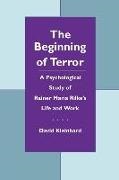Read more
Beginning with Rilkes novel, The Notebooks of Malte Laurids Brigge, published in 1910, The Beginning of Terror examines the ways in which the poet mastered the illness that is so frightening and crippling in Malte and made the illness a resource for his art. Kleinbard goes on to explore Rilkes poetry, letters, and nonfiction prose, his childhood, marriage, and the relationship between illness and genius in the poet and his work, a subject to which Rilke returned time and again. This psychoanalytic study also defines the complex connections between Maltes and Rilkes fantasies of mental and physical fragmentation and the poets response to Rodins disintegrative and re-integrative sculpture during the writing of The Notebooks and New Poems. One point of departure is the poets sense of the origins of his illness in his childhood and, particularly, in his mothers blind, narcissistic self-absorption and his fathers emotional constriction and mental limitations. Kleinbard examines the poets struggle to purge himself of his deeply felt identification with the "ghostly" and "unreal" Phia Rilke, whose hopes that her son would be a major poet he was fulfilling. The book also elucidates Rilkes attempt to convert his father, Josef Rilke, before he died, to confidence and satisfaction in his sons alien achievements, and contains chapters on Rilkes relationships with Lou Andreas-Salome and Auguste Rodin, who served as parental surrogates for Rilke.
Summary
Beginning with Rilke's novel, "The Notebooks of Malte Laurids Briggs", this psychological study examines how the poet mastered the illness that is so frightening and crippling in "Malte" and made the illness a resource for his art. It also draws upon his relationships with his parents.

